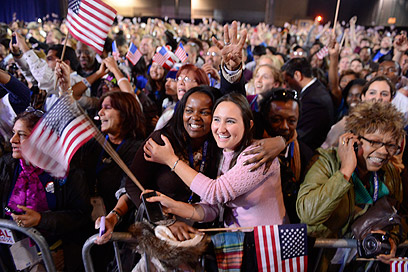
It is extremely complex, this voting public. It is a rich, diverse and intricate mosaic of minorities, immigrants, interest groups and religions, esteemed artists and intellectuals from the largest cultural centers, angry pensioners from the periphery, women, single-parent families, members of the LGBT community and others.
All of the pundits have said that this voting public gave Obama another four years in office, and it is surprisingly similar in its complexity to the Israeli voting public: Poor people, ultra-Orthodox, Arabs, traditional Jews, new immigrants from Russia and Ethiopia, seculars, people who live in various "bubbles," tycoons and millions of others who are having trouble making ends meet.
So, would it be possible to form a large united bloc of minorities to create a stable coalition that will improve the lives of these same minorities? Or maybe, when the elections are over, we will fall right back into a swamp of conflicting interests and the leaders will continue to have their hands tied by their constituents and govern mainly by making TV appearances and false promises.
Some will say that the voting public in America has an advantage because there are only two major parties with vastly different platforms, while in Israel there are many parties, so the only way to change the situation is to introduce a new system of government. Perhaps this is true, but what do we do now – rightists and leftists alike – while the current system exists?
The Right has already come up with a partial solution by merging Likud with Yisrael Beiteniu, but this new political entity will be able to rule only by forming a coalition with representatives of various sectors. Thus, its ability to implement its policy will be limited. This entity will be blocked at the exact same spot where Netanyahu's government was blocked.

Can it happen here? Obama supporters celebrate (Photo: EPA)
On the other hand, there is no indication that a union of the center-left parties will win enough Knesset seats that would allow this hypothetical political entity to also break free from any dependency on the interest groups. Can the center-left parties merge with the haredim? This is highly unlikely. With the Arab parties? Not with the racist and isolationist atmosphere in some segments of this center-left bloc. We're stuck.
We are not stuck because of the system of government, but because of the various sectors' inability to agree on even one unifying idea. Let's assume that the majority of Israelis agree that these elections should focus on the country's economic and security-related problems; even then, the various parties, both rightist and leftist, offer so many different ways to handle these problems that it would be impossible to form an effective unified bloc in order to gain a majority. Moreover, the haredi and Arab sectors are still committed to solving their own unique problems first.
During the election campaign, the Likud will say that it has always been a social party that has supported the Sephardic community, but the voting patterns of its representatives in the Knesset and cabinet prove otherwise. The center-left will tell you that only it can improve the lives of the poor and tackle the problems of the middle class, but no one can explain how the solutions for these problems will be funded, particularly when the next government will have to deal with the Iranian nuclear threat. The opposite is true as well, because the Right will never be able to make good on its promise to improve the economic situation of Israel's citizens without radically changing its position on diplomacy, security and governance, as well as its budget allocation policy, which favors only one sector.
We have to admit that in this regard the American democracy has a huge advantage over our own: The minorities that voted for Obama came together to promote a more responsible, less aggressive form of capitalism, a non-belligerent foreign policy and a liberal attitude vis-à-vis human rights. Even the most optimistic Israelis do not believe this can happen here, certainly not in the upcoming elections and certainly not before another large wave of social protest floods the streets.
If we really want to change Israel's sectoral priorities, the social protest rallies must be held simultaneously in Bnei Brak and Qalansawe, in Ariel and Nahariya, in Sakhnin and Herzliya. But there is no chance of this happening anytime soon. The rain will keep us indoors, on Election Day we will vote for the candidates we supported in the previous elections, and then we will be amazed when our leaders will once again say they cannot govern properly.















